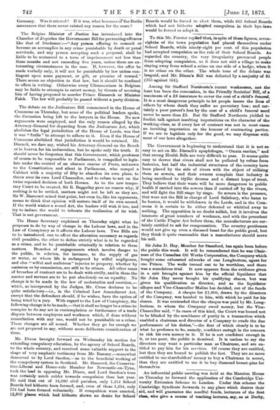The debate on the Judicature Bill commenced in the House
of Commons on Thursday, but none of the political leaders spoke, the discussion being left to the lawyers in the House. No new arguments were employed, and the only reason alleged by the Attorney-General for departing from the Judicature Act, which abolishes the legal jurisdiction of the House of Lords, was that it was " futile " to attempt to adhere to it. Even if the House of Commons abolished that jurisdiction it would be retained. Mr. Disraeli, we dare say, wished his Attorney-General on the Bench or in heaven for his indiscretion, but he spoke only the truth. It should never be forgotten that this Government, which professes of course to be responsible to Parliament, is compelled to legis- late under the control of an obscure caucus of Peers, unknown to the Constitution and silent in Parliament, who compel a Cabinet with a majority of fifty to abandon its own plans, to throw over its own Lord Chancellor, and to refuse to act on the twice repeated decision of both Houses. As to the new tempo- rary Court to be created, Sir R. Baggallay gave no reason why, if nothing is to be settled, matters might not be left as they are. Sir W. Harcourt seized that point, but even he, like his opponents, seems to think that opinion will mature itself of its own accord. If the world wishes a sound Act, the leaders will wish it too, and try to induce the world to tolerate the realisation of its wish. That is not government.


































 Previous page
Previous page